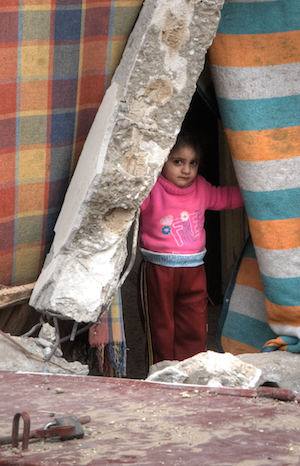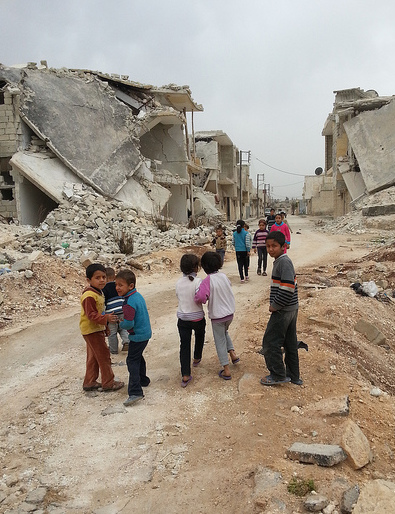On 23-24 May, states, UN agencies, international organisations and civil society will meet in Istanbul for the World Humanitarian Summit. The Summit was called to address the most serious challenges the world faces in responding to the needs of people caught up in conflicts, disasters and other crises.

A girl in temporary shelter in Gaza © Marc Garlasco
The use of explosive weapons with wide-area effects in populated areas has been recognised as a key humanitarian issue by a number of states, the UN Secretary-General, the International Committee of the Red Cross, and civil society. A clear pattern of harm has been documented from this practice: when explosive weapons are used in populated areas 92% of direct casualties are civilian. Bombing and bombardment in towns and cities causes widespread civilian death and injury, the destruction of vital infrastructure, and is a root cause of displacement.
The UN Secretary-General and the head of the ICRC, in a recent unprecedented critique of international efforts to protect civilians in conflict, demanded that states stop the use of “heavy explosive weapons in populated areas.” More than fifty states have now recognised the humanitarian harm caused by the use of explosive weapons in populated areas. A process is now underway, led by Austria, for states to adopt a political commitment to better protect civilians from this practice. This will represent a first step towards addressing this issue. INEW is calling on states to support this process, as has the UN Secretary-General.
The Summit represents an opportunity for states to renew their commitment to the protection of civilians living through conflict, including from the severe ongoing harm caused by explosive weapons.
Read INEW’s briefing paper sent to states for the World Humanitarian Summit
The UN Secretary-General’s report for the Summit, “One Humanity: Shared Responsibility,” which identifies key humanitarian problems and suggested international responses to them, recognises the use of explosive weapons in populated areas as a crucial issue.

Children in Azaz, Aleppo governorate in Syria (© IHH Humanitarian Relief Fondation https://flic.kr/p/mC9de1)
Describing explosive weapons as the “primary killer of civilians in conflict”, the Secretary-General observes that “those who plan or decide to launch barrel bombs, mortars, rockets, or other explosives with wide-area effects into urban areas can easily anticipate that they will cause excessive harm and destruction by killing large numbers of civilians, destroying homes, severely hindering critical services, and leaving behind explosive remnants of war for years.”
The Secretary-General calls for “firm political commitments to constrain the use of these weapons” and for a commitment “to refrain from using explosive weapons with wide-area effects in populated areas.”
At the Summit, states and organisations are asked to make pledges on the areas identified in the report, with a range of ‘core commitments’ proposed in advance for discussion at roundtables at the Summit covering these different areas.
The roundtable on ‘upholding the norms that safeguard humanity’ includes a core commitment that addresses explosive weapons use (core commitment two), which calls on stakeholders to: “Commit to promote and enhance the protection of civilians and civilian objects, especially in the conduct of hostilities, for instance by working to prevent civilian harm resulting from the use of wide-area explosive weapons in populated areas, and by sparing civilian infrastructure from military use in the conduct of military operations.”
INEW is encouraging states attending the Summit to:
- Endorse all of the Core Commitments to “uphold the norms that safeguard humanity” as recommended by the UN Secretary-General.
- In general statements and interventions, express concern about the use of explosive weapons in populated areas, as a key cause of widespread civilian death and injury, and destruction of infrastructure, and is a root cause of displacement.
- Register interest in participating in the High Level Roundtable on “Upholding the norms that safeguard humanity”.
- Attend the side event on “Explosive weapons in populated areas and the need to better protect civilians” on Monday, 23 May, at 15:00-16:30. Location: Hisar (330 – Theater) in the Lüfti Kirdar Convention and Exhibition Center (LKCC).
INEW and its members have made our own commitments for the Summit, on addressing the harm caused by the use of explosive weapons in populated areas, which can be read here.
